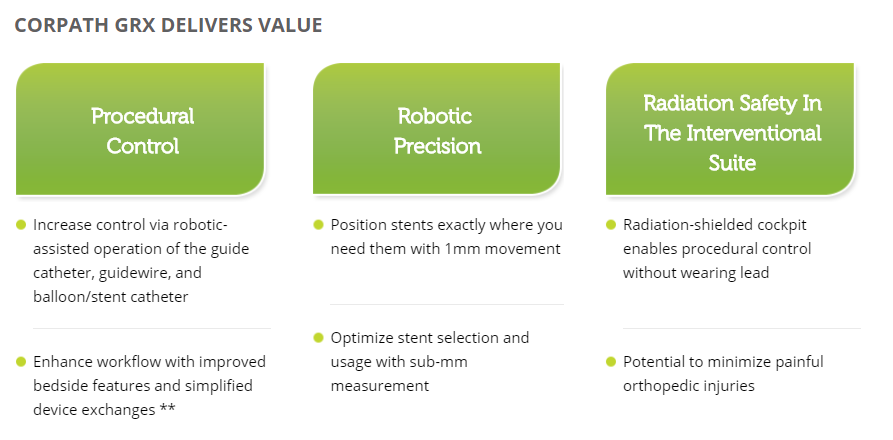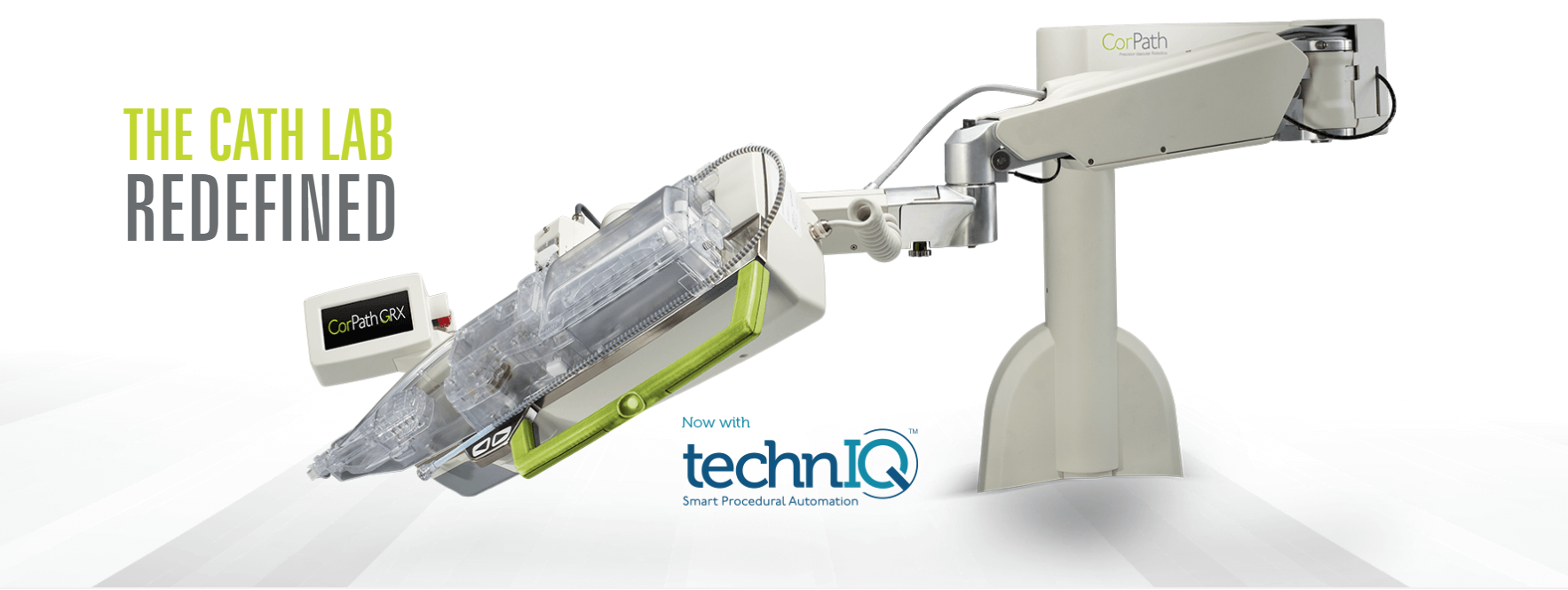WHAT IS ROBOTIC-ASSISTED PCI?
THE BENEFITS OF PRECISION VASCULAR ROBOTICS
Today, many procedures that were once highly invasive are now being performed via minimally invasive techniques, with the added benefit of robotic precision and radiation protection.
MANUAL VS. ROBOTIC-ASSISTED PCI
Since the introduction of intervention 40 years ago, there has been an astonishing amount of advancement in the technology and devices used in the procedure, however the way the procedure is performed has remained virtually unchanged. Now, robotics has the potential to overcome some of the current limitations of the traditional manual approach to vascular interventions.
ROBOTIC PRECISION MAY IMPROVE OUTCOMES, ECONOMICS & SAFETY
MANUAL PCI
ROBOTIC PCI



ASSESS ANATOMY
At times a struggle to see
angiography
Close proximity, ergonomic visualization

NAVIGATE
Trial and error, wire spinning
Precise ‘Point & Shoot’ predictablility

MEASURE
ANATOMY
‘Eyeball’ estimate or
IVUS/OCT
Robotic-assisted sub-mm measurement

POSITION STENT
Manual adjustment
1 mm precise positioning

DEPLOY STENT
Devices loose during inflation
Devices held in place during deployment

ORTHOPEDIC
STRAIN & FATIGUE
Significant
Potential to reduce

RADIATION EXPOSURE
High exposure
Significantly reduces radiation for primary operator and potential to decrease for staff
CORPATH: THE WORLD’S 1st ROBOTIC-ASSISTED PLATFORM FOR PCI AND PVI
The CorPath System is the first FDA-cleared robotic platform designed for interventional physicians. During a CorPath Robotic-assisted intervention, physicians sit in a radiation-shielded workstation and use a set of joysticks
and touchscreen controls that translate the physician’s movements into device control. Robotic-assisted intervention enables precise measurement of anatomy and device
positioning with the added benefit of radiation protection for the
physician and the potential to reduce radiation exposure
for staff and patients.

HOW IT WORKS
CORPATH GRX PRECISION VASCULAR ROBOTICS
The CorPath GRX Vascular Robotic System provides value for physicians, staff, and patients during interventional procedures where precise device and stent positioning is a top priority:

Procedural Control
Robotic-assisted control of coronary guide catheters, guidewires, and rapid exchange catheters.

Robotic Precision
Sub-millimeter measurement and 1mm movement to position stents exactly where you need them.

Improved Workflow
Extended Reach Arm for radial access and redesigned Bedside Unit with touchscreen for ease of use.

Protection
Radiation protection to the physician and potential to reduce radiation exposure for staff and patients.
EXPLORE CORPATH GRX

ACTIVE GUIDE MANAGEMENT
Robotic-assisted control of guide catheter enables necessary adjustments during complex vascular cases.

technIQ™ – SMART PROCEDURAL AUTOMATION
Rotate on Retract (RoR) enables quick navigation to a targeted lesion by automatically rotating the guidewire upon joystick retraction, providing a consistent and predictable movement. Pre-clinical studies utilizing RoR show a significant decrease in wiring time and less variation between operators. This is the first step to our goal of full autonomous navigation.

RADIATION SHIELD & POWER VISION MONITOR
Work from a seated position without wearing lead. Optional 40” widescreen monitor with 4K resolution enhances clinical visualization.

BEDSIDE TOUCHSCREEN
Simplify technologist workflow with on-screen procedure status and instructions for use.
CORPATH GRX BENEFITS
PROVEN PATIENT & PROVIDER BENEFIT
CorPath GRX is a second generation robotic-assisted system built on the foundation of the CorPath 200’s clinical success with over 3,000 cases across more than 40 cardiovascular programs worldwide.
When using the CorPath System, studies have shown:*

Clinical Success in Complex Cases
The CORA-PCI Trial demonstrated 99.1% clinical success in complex cases along with comparable procedure times to manual PCI.1

Reduction in Stent Usage
A recent study demonstrated that accurate measurement of coronary anatomy, using CorPath, reduced the use of unnecessary additional stents by 8.3%.2

Radiation Reduction to the Patient
A single center retrospective study published in the Journal of Invasive Cardiology demonstrated a 17% reduction in radiation dose to the patient compared to manual PCI.3

Radiation Reduction to Physicians
The PRECISE trial demonstrated a 95% reduction in radiation exposure to the primary operator.


